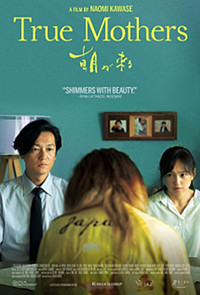| SHADOWS ON THE WALL | REVIEWS | NEWS | FESTIVAL | AWARDS | Q&A | ABOUT | TALKBACK | |||||||||||||
 Shadows off the beaten path Shadows off the beaten pathIndies, foreign, docs and shorts...
On this page:
4X4 |
IDENTIFYING FEATURES |
TRUE MOTHERS
| |||||||||||||
| See also: SHADOWS FILM FESTIVAL | Last update 31.Jan.21 | |||||||||||||
|
4x4 Review by Rich Cline | 
| |||||||||||||
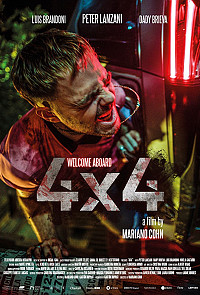 <dir Mariano Cohn scr Mariano Cohn, Gaston Duprat prd Gaston Duprat, Jaume Roures with Peter Lanzani, Dady Brieva, Luis Brandoni, Noelia Castano, Fabio Alberti, Alejandro Paker, Valeria Mitidieri, Hector Fernandez Rubio, Gustavo Horacio Rodriguez, Emma Rivera, Lucas Pose Cuellar, Mariano Damian Azcurra release Arg 4.Apr.19, UK Oct.19 gf, US 5.Feb.21 19/Argentina 1h32 Is it streaming? |
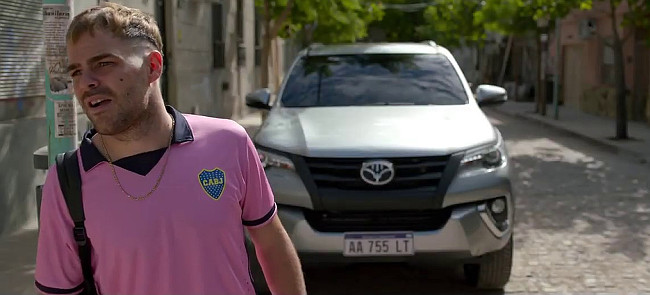 With a high-concept premise, this contained action movie traps a young lowlife in a high-tech car and puts him through the wringer. While the narrative is simple, filmmaker Mariano Cohn weaves in blackly astute comments on a range of pungent social issues, from police corruption to mob justice, like an expression of frustration at a system that has failed pretty much everyone. It's also a riveting, nasty little thriller. A petty criminal, Ciro (Lanzani) breaks into a flashy SUV to strip out its electronic system and perform some scatological vandalism. Then he discovers that he's locked inside, and no one outside can see or hear him. Then when he tries to break his way out, he only injures himself. Eventually, the fortified vehicle's owner Quique (Brieva) calls through the hands-free system, revealing that he's in control now, and he intends to teach Ciro a harsh lesson. As time passes, Ciro begins to feel increasingly desperate, while Quique only increases his torment. Much of the film is virtually silent, as Ciro struggles against the idea that he may have no options here. And his only companion inside the car is a cricket. Then on the speaker-phone, Quique taunts Ciro with rambling stories from his life and sermons about morality while changing the temperature inside from frosty to sweltering. Meanwhile, Ciro is watching events play out around the car, helpless to catch anyone's attention. And he's also wasting away from hunger, thirst and a nasty infection. Lanzani is magnetic as Ciro, a charismatic young man who isn't terribly bright. But he's likeable in his defiant arrogance, mainly because Lanzani skilfully reveals an underlying, reluctant recognition that maybe he's actually in serious trouble. Meanwhile, Quique gets under his skin, provoking a range of emotions as he discovers things about his personal life, which results in some surprising reactions. When Brieva appears for the final act, his casually confident presence alters the film's tone. There are several intriguing themes wafting through this film, including Ciro's observation that he lives in a neighbourhood of poor people who are bound by laws written by the wealthy. And of course there's the whole vigilante angle. Through this ordeal, Ciro is essentially stripped down to his bare essence, so even if the plot is fairly minimal, there's plenty of interest in its human gyrations. And even if the ending feels a little over-the-top, Cohn has so carefully constructed the situation that we're powerfully gripped.
| ||||||||||||
|
Identifying Features Sin Señas Particulares Review by Rich Cline | 
| |||||||||||||
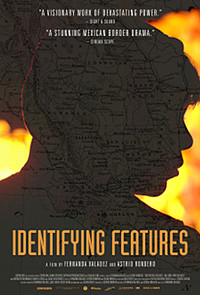 dir Fernanda Valadez scr Fernanda Valadez, Astrid Rondero prd Astrid Rondero, Fernanda Valadez, Jack Zagha, Yossy Zagha with Mercedes Hernandez, David Illescas, Juan Jesus Varela, Ana Laura Rodriguez, Manuel Campos, Laura Elena Ibarra, Xicotencatl Ulloa, Armando Garcia, Bertha Denton Casillas, Primo Lara, Samuel Munoz, Narda Rivas release Mex Oct.20 ficm, UK Oct.20 lff, US 22.Jan.21 20/Mexico 1h38 SUNDANCE FILM FEST  Is it streaming? |
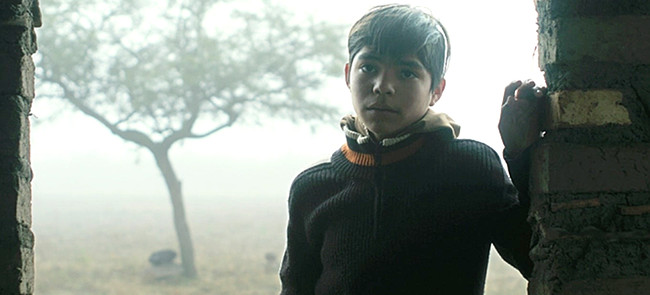 With an intensely personal story set against a documentary background, this Mexican drama unfolds in an artful way that oddly limits its emotional impact., Most people never bother to see the humanity behind the news headlines about illegal immigration, but the events depicted here are frighteningly commonplace. Director Fernanda Valadez opts for a stylised but somewhat clinical approach, revealing the personal story but keeping it at arm's length. Teen friends Jesus and Rigo (Varela and Garcia) leave their homes in central Mexico to travel into the United States, and officials think they must have perished crossing the border. While Rigo's mother Chuya (Ibarra) has proof that her son died, Jesus' mother Magdalena (Hernandez) has only conjecture, so she decides to trace his journey herself. At the border she meets the eye surgeon Olivia (Rodriguez), who has been searching for her son for for years. And she crosses paths with Miguel (Illescas), a young man who has been deported back into Mexico. The narrative flickers rather randomly between Magdalena, Olivia and Diego. The mothers question why their sons left when they had their families and good jobs. And after several years working in the States, Diego is feeling lost, especially when he returns to his hometown, which has been decimated by criminal kingpins. Where the story goes is harrowing and often downright horrifying, as the film depicts aspects of Mexican society that are unthinkable. In the central role, Hernandez offers a riveting, resonant performance as a woman who simply wants to know what the truth about her son. Her expressive eyes hold the attention. Magdalena's journey is difficult, with obstacles, challenges and dead-ends, and Hernandez plays her tenacity with underlying urgency. Rodriguez is particularly strong as Olivia, although her character disappears early on. As Miguel, Illescas is also sympathetic, especially as he worries about what happened to his family. The story covers issues that have huge significance for residents of Mexico, and Valadez's approach is to depict these things in rather obliquely, showing incidents without context or literally blurring them. One key moment is narrated in a local dialect without subtitles. This makes the film an impressionistic depiction of the horrors of violent men who prey on the vulnerable, whether they're quietly living their lives or trying to find a better one. It's shot with impressive artistry, but a more accessible narrative would have made it even more involving.
| ||||||||||||
|
True Mothers Review by Rich Cline | 
TORONTO FILM FEST Is it streaming?
|  Exquisitely shot to capture both natural beauty and nuanced performances, this unhurried Japanese drama explores the various sides of an adoption story. Filmmaker Naomi Kawase creates a remarkably intimate tone, catching details in the connections between characters, while also stirring in scenes that have a bracing documentary realness to them. And amid vague hints of mystery, there's also a lot of light, wind and water linking the people and themes. Parenthood is the usual mix of joys and stresses, but Satoko and Kiyokazu (Nagasaku and Iura) adore their cheeky 5-year-old son Asato (Sato). Understandably so since, after exhausting a range of options trying to conceive a child, they went through a rigorous process to adopt him through a halfway house managed by Shizue (Asada). And now they're shocked when Asato's birth mother Hikari (Makita) says she wants him back, threatening them with public humiliation if they won't pay her. But her blackmail attempt raises questions about her identity. Indeed, there is a story here. The film cycles back to tell earlier stories, starting with the pressure of childlessness on this young couple's marriage. Because the physical issue is his, Kiyokazu feels useless, but adoption gives them hope. Another extended flashback reveals Hikari's past as a girl who falls for the cute boy (Tanaka) at school. Their sweet, sun-drenched romance is involving, as is her rather stern parents' (Nakajima and Hirahara) stress when she becomes pregnant at 14. Her experience at Shizue's centre for pregnant teens is superbly well-observed. As is her five-year yearning for her child. Performances are low-key and naturalistic, finding earthy humour in unexpected moments. Most of the scenes have a raw emotionality that's easy to identify with, mixing happy and sad feelings at pivotal moments in the characters' lives. At the film's centre, Makita has particularly strong impact as the teen who is unsure about this decision adults have made for her. It's her journey that resonates most strongly. And her connection with Asada's endlessly kind Shizue is finely played. As the title suggests, various mothers have key roles in this story, and there are sweeping themes that intertwine around each one. The central idea is that giving birth and childrearing are important but essentially separate roles. And in cases like these, it's not biology that makes a true mother. The melodramatic tone and extended running time sometimes feel a bit indulgent, as Kawase plays with ideas of nature and nurture, but it leads to a lyrical ending that's very moving.
| 
See also: SHADOWS FILM FESTIVAL © 2021 by Rich Cline, Shadows
on the Wall
HOME | REVIEWS | NEWS | FESTIVAL | AWARDS
| Q&A | ABOUT | TALKBACK | | ||||||||||

